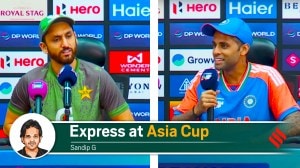Hold Advani to his word
In India, policies and decisions have often been delayed or subverted because of fixed conventions. Opposition parties often oppose for the ...

In India, policies and decisions have often been delayed or subverted because of fixed conventions. Opposition parties often oppose for the sake of opposing; governments often refuse to consult the Opposition simply to assert their authority. This vicious circle, where the Opposition accuses the government of not consulting them enough, and the government accuses the Opposition of not giving sufficient cooperation, needs to be urgently broken.
In a recent Walk the Talk interview, L.K. Advani declared that he was open to cooperating with the UPA and its constituents on many legislative issues. The Congress and its allies should hold Advani to his word. It should be possible for the Congress and the NDA to get together to ensure that a significant amount of legislation, on whose desirability they both agree, should pass. Why cannot the model of cooperation on foreign policy issues be extended to other areas? Indeed, such cooperation is the only way of ensuring that policy-making is not held hostage to the veto power exercised by small and uncompromising parties like those on the Left. Small parties are gaining power because national parties are refusing to cooperate. Such cooperation as Advani envisages is, of course, easier said than done. Both the NDA and UPA now have a history of grandstanding that will not be easy to overcome. Second, much of the conflict between the various political parties now stems from the personalisation of politics. The fact that parties in power usually try and embarrass their opponents by using or misusing the CBI has led to the politics of recrimination.
How will we evolve a political culture where genuine cases can be pursued free of political interference? Much of the possibility of the kind of cooperation that Advani is talking about depends upon an answer to this question. All political parties should now realise that the politics of revenge is collectively harming them. Being obstructionist for the facile objective of denying your opponent credit, discredits the political process as a whole. Advani’s call for cooperation should extend not just to immediate legislative matters, but also to creating conventions that benefit all parties in the long run. A genuine democratic sensibility can be created only on the basis of a willingness to compromise and negotiate. Advani rightly argued that the only way to move things forward is through a politics of consensus. But creating such a consensus will require the BJP to overcome the bitterness of its defeat, and the Congress, the arrogance of its power. It will require leaders to act like statesman, not politicians. This may seem a tall order in the present political climate but worth giving a shot.






- 01
- 02
- 03
- 04
- 05

























